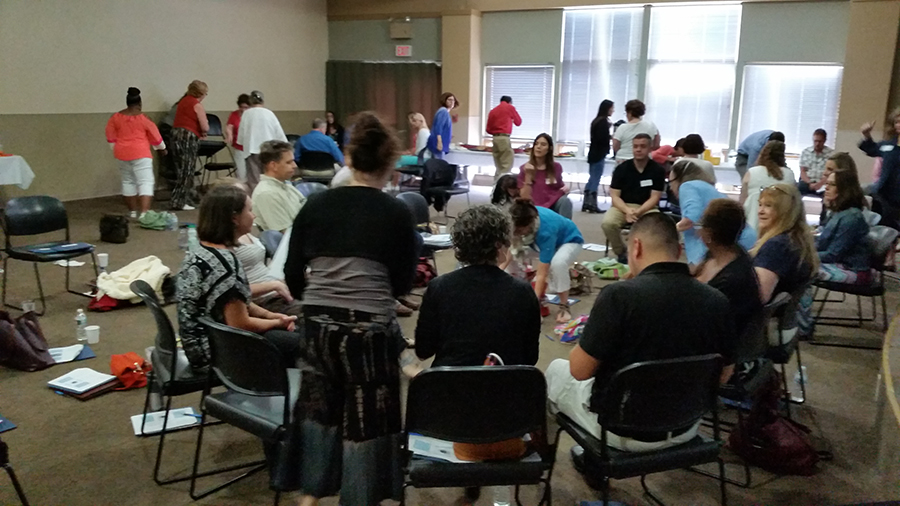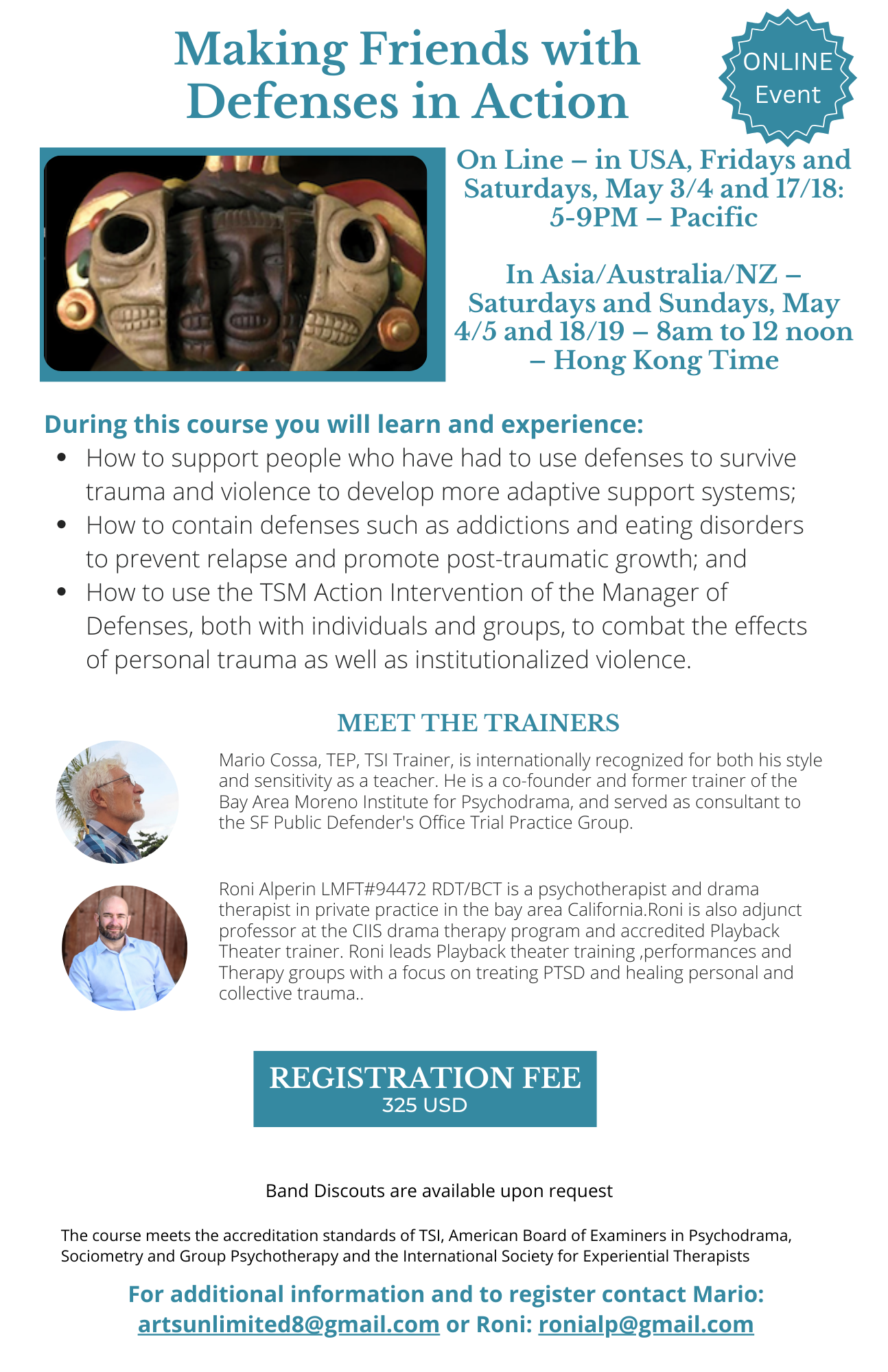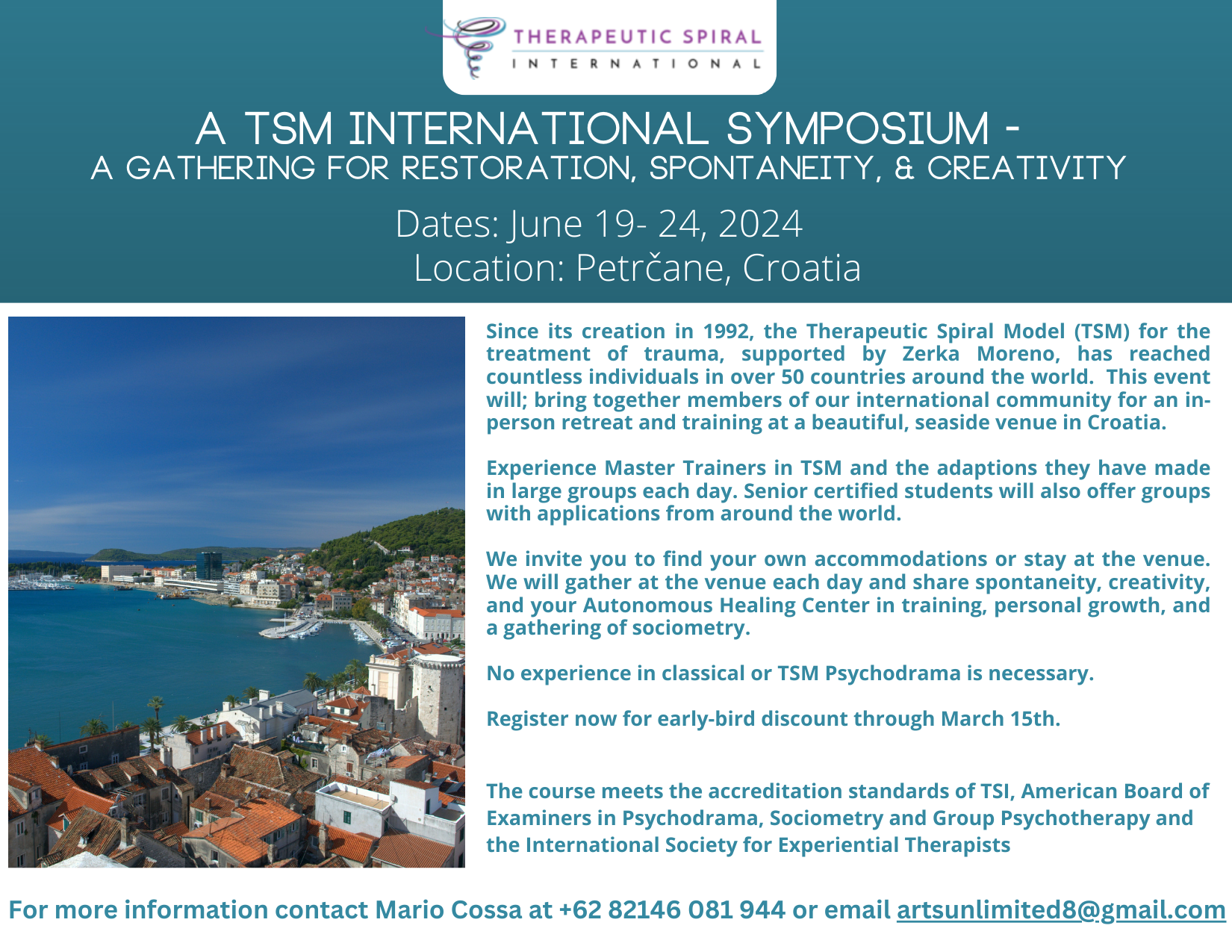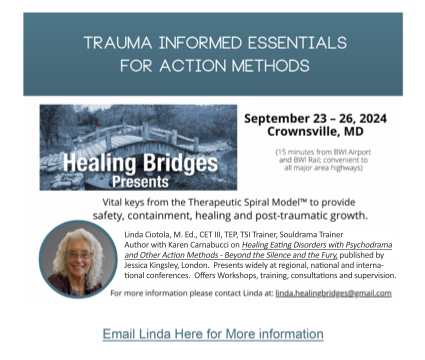TSI Certification Process
An Overview
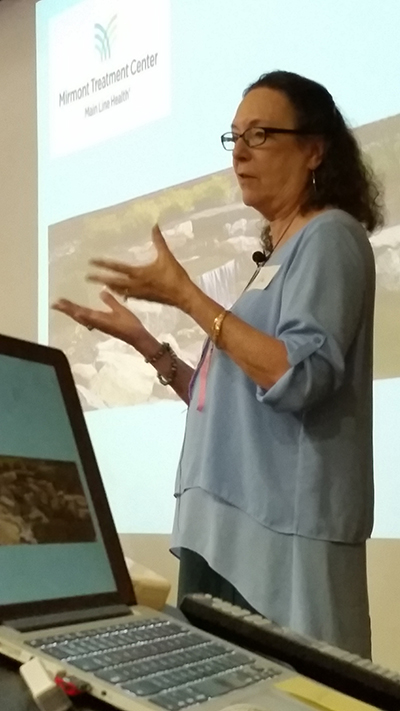
Dr Kate teaching at Mirmont Treatment Center, Lima, PA
What is TSM?
The Therapeutic Spiral Model (TSM) is a form of clinically-modified psychodrama used for the safe and effective treatment of trauma. Since the inception of TSM in 1992, thousands of people around the world have benefited from its application. TSM addresses trauma resulting from physical/emotional abuse, childhood sexual abuse, rape and sexual assault, ethnic conflict, torture and other forms of political or structural violence. TSM is based on the premise that survivors of trauma need to be adequately resourced with a set of roles that can be internalized for greater awareness, resilience, and post-traumatic growth. Only when this is accomplished can survivors fully explore, understand, and release themselves from the debilitating impact of traumatic events.
TSM is an acknowledged and research-supported method of using clinically-modified psychodrama and experiential psychotherapy to treat trauma with individuals, groups, and communities who present with symptoms of PTSD, anxiety, and/or depression. TSM has also been applied to addictions and eating disorders, as well as to uses in education, theatre, community building, business, and law.
Therapeutic Spiral International (TSI) offers a comprehensive training program in TSM psychodrama to treat Post-Traumatic Stress Disorder and its aftermath and to promote post-traumatic growth. This training is for mental health care professionals, educators, community organizers, business persons, lawyers, or volunteers who wish to learn or improve their skills in working with people who are highly stressed or suffer from PTSD.
Criteria for Entry into the Certification Process in TSM Psychodrama
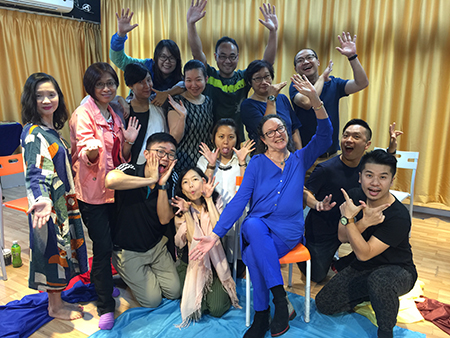 Master’s degree and working toward certification in psychodrama or other experiential or expressive arts therapies. Note: Candidates who do not possess these qualifications, but have comparable international qualifications, equivalent clinical experience, or experiential training, can apply to the Clinical Director and Director of Training for an entry requirements waiver.
Master’s degree and working toward certification in psychodrama or other experiential or expressive arts therapies. Note: Candidates who do not possess these qualifications, but have comparable international qualifications, equivalent clinical experience, or experiential training, can apply to the Clinical Director and Director of Training for an entry requirements waiver.- Participation in at least one TSI Training workshop and/or one TSI Personal Growth workshop, in which appropriate auxiliary roles are taken as a group member.
- Recommendation of the Team Leader or Trainer from the TSI workshop(s) in which the candidate has participated in order to begin the formal TSI training process.
- Submission to the Clinical Director and Director of Training of the candidate’s curriculum vitae, together with a letter or e-mail requesting entry to the TSM Certification process including a brief paragraph outlining why the candidate is applying and what they hope to get from the program.
- Application fee of US$100.
Once accepted, an in-person or electronic interview with either Director will guide the applicant to select the appropriate certification program.
Therapeutic Spiral International offers certifications in the theory, the practice, and the training of the TSM.
Summary of Certifications in TSM Psychodrama
The International Certification in Experiential Trauma Therapy using the Therapeutic Spiral Model – Level I: Introduction to Theory is awarded to those who have completed:
- four, Level I – Core Trauma Courses;
- at least one, TSM Personal Growth Workshop;
- required reading;
- appropriate supervision; and
- a reaction paper of approximately 5,000 words (in English) exploring how TSM theory has and/or will influence your professional work. A training journal maintained during the training process may be submitted in lieu of a more formal reaction paper.
Additional course details, reading and supervision requirements are provided further down in this document.
The International Certification in Experiential Trauma Therapyusing the Therapeutic Spiral Model – Level II: Advanced Theory and Practiceis awarded to those who have completed:
- all requirements for the Level I Certification (described above);
- completion of three, Level II – Advanced Clinical Courses;
- behavioral demonstration of specific skill sets at each level of certification desired;
- The three levels of this certification are Trained Auxiliary Ego (TAE), Assistant Leader (AL), and Team Leader (TL);
- and appropriate supervision.
Additional practice details and supervision requirements are provided further down in this document. Note: Practical experience applicable toward TAE and AL Certifications may begin while candidates are still completing Level I requirements.
The International Trainer Certification in the Theory and Practice of Experiential Trauma Therapy using the Therapeutic Spiral Model is awarded to those who have completed:
- all requirements for both the Levels I and II Certifications (described above);
- co-teaching of each of the courses for which certification is given;
- solo teaching of each of the courses for which certification is given with on-site or video supervision;
- serving as Presenter or Co-Presenter of a TSM-themed workshop at a national or International conference; and
- appropriate supervision.
Additional training details and supervision requirements are provided further down in this document. Note: Trainer Certification is given on a course-by-course basis.
Training workshops for 2019-2020 are currently scheduled in the United States, Canada, China, Croatia, Egypt, India, Spain, and Taiwan with more to be added. Please click here to access our calendar.
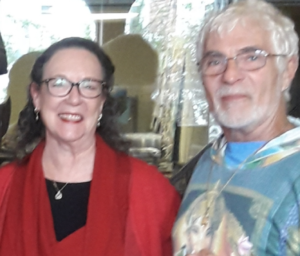
Kate Hudgins, PhD, TEP, and Mario Cossa, RDT/MT, TEP, serve as Co-Directors of Therapeutic Spiral International. Kate serves as Clinical Director and Mario as Director of Training. Both serve as primary trainers for TSM course work and personal growth experiences. They also provide required supervision for those wishing to achieve any of the International Certifications. Additional training and supervision may also be provided by others after consult with the Clinical Director.
Excellent supervision, in-person, by Skype or other cyber means, video review, and e-mail is provided by the training team to maintain the highest levels of safety and learning for students in the certification programs.
Continuing Education Credits
In addition to TSI certifications, credit hours for workshops with TSI Trainers who are also TEPs, PATs, and/or RDTs may be applied toward certification with the American Board of Examiners in Psychodrama, Sociometry and Group Psychotherapy, the American Society for Experiential Therapists, and the North American Drama Therapy Association. Accrediting Boards in other countries may also accept these training hours. In addition, continuing education hours may be available for psychologists, social workers, marriage and family therapists, addictions counselors, licensed professional counselors, and certified group psychotherapists.

Structure of the TSI Certification Programs
TSI International Certifications in Experiential Trauma Therapy include theory, practice, and supervision. The required courses can be taken as stand-alone workshops and each provides immediately useful TSM clinical action interventions. This comprehensive training program with its highly experiential format is presented both in weekend workshops and week-long intensives, and teaches participants how to address trauma safely with action methods. Each course is generally a minimum of three days.
Because of the use of demonstrations, supervised technique practice, and full TSM Psychodramas, skills are developed quickly and effectively. In addition, all participants have the opportunity to focus on their personal issues and to assist with others’ healing. Often people start with attendance at a personal growth workshop for professionals to experience TSM for themselves and to meet the requirement for a personal experience in addition to the training requirements.
Maintaining Certifications
Once an individual is certified as a TAE, AL, or TL they are expected to serve as a team member or offer a workshop as a TL for a TSM workshop at least once a year. Once certified as a Trainer they are expected to offer at least one TSI-sponsored workshop or Training per year or present at a national or International Conference on a TSM topic.
Diploma Program in Egypt:
Additionally, TSI offers an International Diploma program in Egypt, adapted from the full TSI certification in trauma therapy model, and reflecting the needs of the setting and culture. The program in Egypt is specially designed to work with structural violence.
This 3-year Diploma in TSM offers a comprehensive training path for psychiatrists, psychotherapists and social workers who wish to develop skills in the use of psychodrama for transforming individual and collective trauma. The program includes experiential immersion in TSM through intensive training blocks, student directing, readings and written assignments. Participants will also undertake supervised practice in community-based interventions using TSM to address various forms of violence and oppression. Graduates of the program will receive a Diploma in the Therapeutic Spiral Model through Therapeutic Spiral International, USA.
